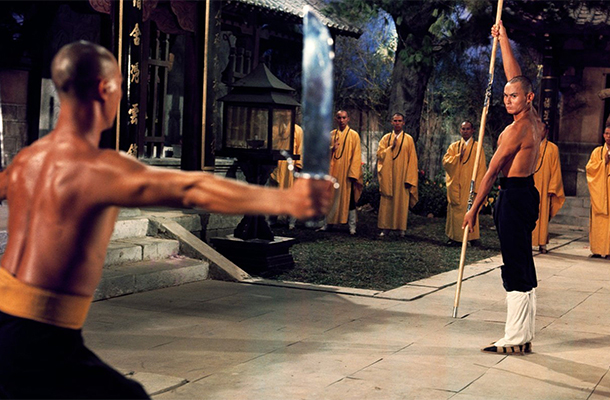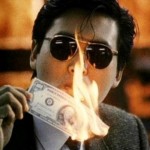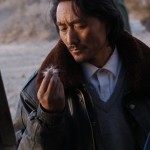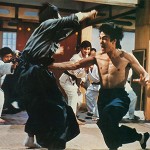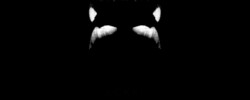
TIFF’s A Century of Chinese Cinema Review: The 36th Chamber of Shaolin (1978)
Cast: Chia Hui Liu, Lieh Lo, Chia Yung Liu
Directors: Chia-Liang Liu
Country: Hong Kong
Genre: Action | Adventure | Drama
Editor’s Notes: The following review of The 36th Chamber of Shaolin is part of our coverage for TIFF’s A Century of Chinese Cinema which runs from June 5th to August 11th at TIFF Bell Lightbox. For more information of this unprecedented film series visit http://tiff.net/century and follow TIFF on Twitter at @TIFF_NET.
36th Chamber of Shaolin begins with a kung fu trope that Lau Kar Leung helped father as Gordon Liu demonstrates various fighting forms that would used throughout the film set against theatrical monochromatic backdrops. The actions have no bearing on the plot; they are simply explorations in human form and martial arts technique that quickly and succinctly capture Lau Kar Leung’s pupil as he demonstrates a mastery of body and mind. It is in this simplicity of pared down cinematic elements that allow Liu to dominate the screen and show the impending potential of his disobedient student character and the obstacles that he will ultimately overcome as later in the film he sets out on one of the most memorable training sequences in the history of the kung fu genre. 36th Chamber is a film that requires no CGI or complicated wire choreography to be one of the most epic and masterfully realized films in kung fu and an artful film that entertains with the whimsy and colors of a Stanley Donen musical.
His earnest attempts to learn these lessons quickly for the sake of his fellow villagers are blunted through the harsh lessons of the Shaolin, indifferent to the transient foolishness of politics and other matters worldly and unworthy of their attention.
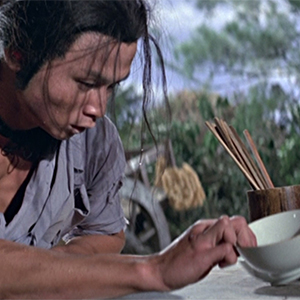 Gordon Liu starts out as the prototypical kung fu student buffoon, a blank slate of arrogance and false self-assuredness, blind to the ugly ways of the world that would soon emerge and change his life forever. His village would be overtaken, forcing him to desperate measures to try and win it back in the name of righteousness. In an attempt to bring the fighting styles of the secluded Shaolin monks to an unjust world that desperately needed its power, Liu’s San Te attempts to join the ranks of the secluded monks to learn their secrets in order to fight the corruption that plagued his village. His earnest attempts to learn these lessons quickly for the sake of his fellow villagers are blunted through the harsh lessons of the Shaolin, indifferent to the transient foolishness of politics and other matters worldly and unworthy of their attention. San Te is forced to rake leaves for an entire year to learn humility and discipline, and to thoroughly show his dedication to learning the ways of the Shaolin.
Gordon Liu starts out as the prototypical kung fu student buffoon, a blank slate of arrogance and false self-assuredness, blind to the ugly ways of the world that would soon emerge and change his life forever. His village would be overtaken, forcing him to desperate measures to try and win it back in the name of righteousness. In an attempt to bring the fighting styles of the secluded Shaolin monks to an unjust world that desperately needed its power, Liu’s San Te attempts to join the ranks of the secluded monks to learn their secrets in order to fight the corruption that plagued his village. His earnest attempts to learn these lessons quickly for the sake of his fellow villagers are blunted through the harsh lessons of the Shaolin, indifferent to the transient foolishness of politics and other matters worldly and unworthy of their attention. San Te is forced to rake leaves for an entire year to learn humility and discipline, and to thoroughly show his dedication to learning the ways of the Shaolin.
Each task is delivered with stoic purpose as the Shaolin finally allow San Te to enter the chambers that would show him their secrets, but each lesson is formulated to challenge each disciple into defeating their own body and mind. The first challenge requires a mastery of balance, and this lesson is either learned or a potential disciple is not allowed to eat. This creates a situation where one must either quit or flourish, and San Te pushes forward in obstinate indignation. The disciples learn each lesson with their own blood and sweat, and the seemingly cruel masters watch in silent approval as San Te begins to show a fast mastery of each challenge laid before him. His inner motivation would seem unworthy to the Shaolin masters that have core beliefs that prevent them from engaging in the trivial matters of the world. San Te would ultimately triumph over the adversity of each challenge (Gordon Liu wouldn’t fare so well as he passed out during the bell ringing challenge), but his village still suffered, forcing him to create inventive ways to hold true to his vows and bring the martial arts technique of the Shaolin to the masses.
Seeing the films in their original glory was a rare luxury in years past, but now that we have these gorgeous transfers available to us we owe it to the masters of the genre to re-explore their works as they originally intended them to be seen.
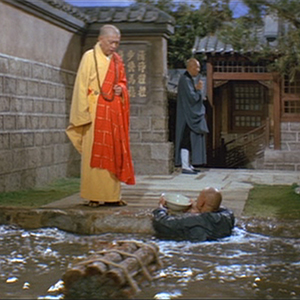 There are vast misconceptions about the art and mastery behind kung fu films from years of haphazard dubs and poorly cropped transfers, but we now have phenomenal transfers and original audio tracks that grant austerity to films that were once wacky bastardizations of their original selves. We can now see the mastery in the filmmaking and watch as each frame is carefully considered, see fight sequences that used groundbreaking in-camera editing techniques not seen in Western cinema, and explore non fight sequences constructed masterfully in the versatile and grandiose Shaw Brothers studio grounds. Seeing the films in their original glory was a rare luxury in years past, but now that we have these gorgeous transfers available to us we owe it to the masters of the genre to re-explore their works as they originally intended them to be seen. I consider Lau Kar Leung, Chang Cheh, and King Hu to be filmmakers that should be included next to names like Ozu, Fassbinder, and Kieslowski. Their art was worlds apart but they shared passion for a medium versatile enough to allow many masters to forge their own technique and speak in many artistic languages as they incite the emotions, imaginations, and intellect of those fortunate to observe it.
There are vast misconceptions about the art and mastery behind kung fu films from years of haphazard dubs and poorly cropped transfers, but we now have phenomenal transfers and original audio tracks that grant austerity to films that were once wacky bastardizations of their original selves. We can now see the mastery in the filmmaking and watch as each frame is carefully considered, see fight sequences that used groundbreaking in-camera editing techniques not seen in Western cinema, and explore non fight sequences constructed masterfully in the versatile and grandiose Shaw Brothers studio grounds. Seeing the films in their original glory was a rare luxury in years past, but now that we have these gorgeous transfers available to us we owe it to the masters of the genre to re-explore their works as they originally intended them to be seen. I consider Lau Kar Leung, Chang Cheh, and King Hu to be filmmakers that should be included next to names like Ozu, Fassbinder, and Kieslowski. Their art was worlds apart but they shared passion for a medium versatile enough to allow many masters to forge their own technique and speak in many artistic languages as they incite the emotions, imaginations, and intellect of those fortunate to observe it.
Related Posts
![]()
Matthew Blevins
![]()
Latest posts by Matthew Blevins (see all)

